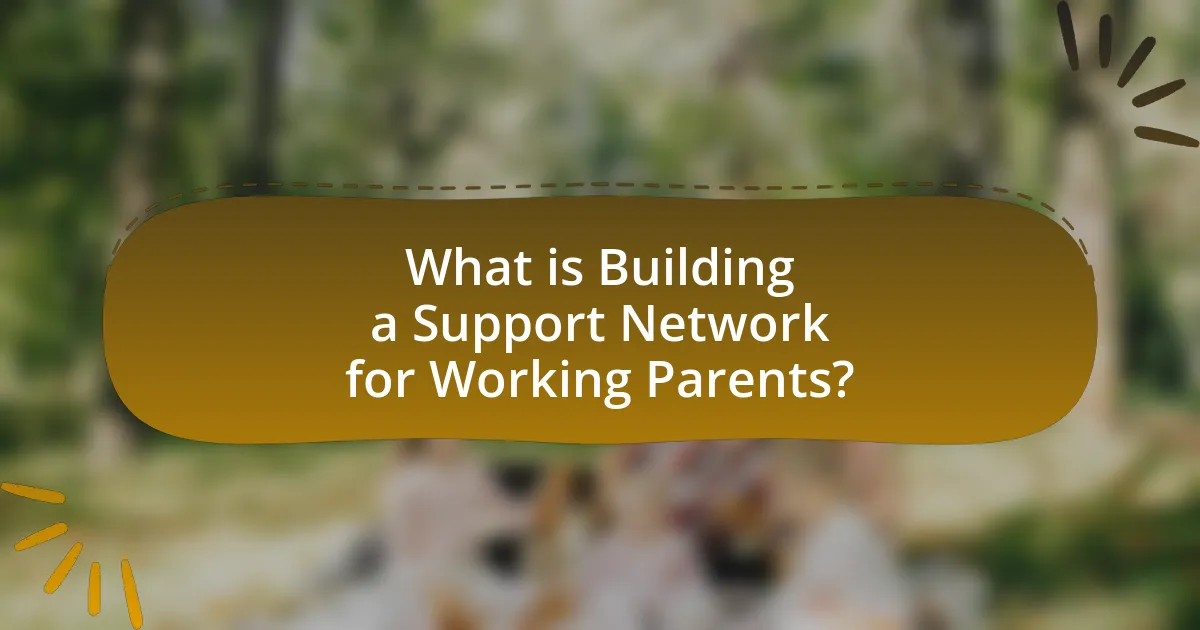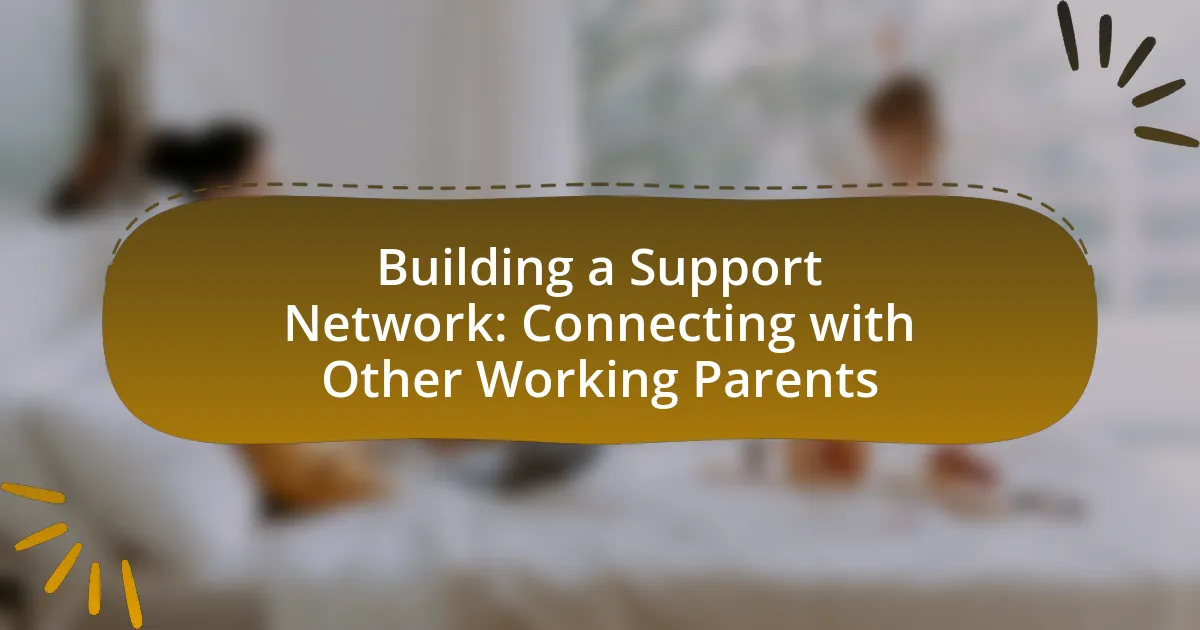Building a support network for working parents involves establishing relationships and resources that offer emotional, informational, and practical assistance. This network can include family, friends, colleagues, and community groups, all of whom play vital roles in alleviating the challenges of balancing work and parenting. The article highlights the importance of such networks in reducing stress and improving mental health, as well as addressing common challenges like time management and childcare responsibilities. It also discusses how effective communication, trust, and shared experiences contribute to a robust support system, ultimately enhancing work-life balance and providing professional opportunities for working parents.

What is Building a Support Network for Working Parents?
Building a support network for working parents involves creating a system of relationships and resources that provide emotional, informational, and practical assistance. This network can include family, friends, colleagues, and community groups who understand the challenges of balancing work and parenting. Research indicates that having a strong support network can reduce stress and improve overall well-being, as evidenced by a study published in the Journal of Family Psychology, which found that social support significantly correlates with lower levels of parental stress.
Why is a support network important for working parents?
A support network is crucial for working parents because it provides emotional, practical, and informational resources that help them manage the challenges of balancing work and family life. Research indicates that parents with strong support networks experience lower stress levels and improved mental health, which can enhance their overall well-being and job performance. For instance, a study published in the Journal of Family Psychology found that social support significantly mitigates the negative effects of work-family conflict, allowing parents to navigate their responsibilities more effectively.
What challenges do working parents face that a support network can address?
Working parents face challenges such as time management, childcare responsibilities, and emotional stress, which a support network can effectively address. Time management issues arise from balancing work commitments and family needs, leading to feelings of overwhelm. A support network can provide shared resources, such as carpooling or babysitting, alleviating some of these pressures. Childcare responsibilities often create conflicts in work schedules; a network can offer flexible arrangements or recommendations for reliable childcare services. Emotional stress, stemming from the dual demands of work and home, can be mitigated through peer support, where parents share experiences and coping strategies, fostering a sense of community. Research indicates that social support significantly reduces stress levels among working parents, highlighting the importance of these networks in enhancing overall well-being.
How can a support network improve work-life balance for parents?
A support network can significantly improve work-life balance for parents by providing emotional, practical, and informational assistance. This network allows parents to share responsibilities, reducing stress and preventing burnout. For instance, studies show that parents with strong social support report higher levels of life satisfaction and lower levels of stress. Additionally, a support network can facilitate childcare arrangements, enabling parents to manage their work commitments more effectively. Research from the American Psychological Association indicates that social support is linked to better mental health outcomes, which directly contributes to a more balanced life for working parents.
Who can be part of a support network for working parents?
A support network for working parents can include family members, friends, colleagues, childcare providers, and community organizations. Family members often provide emotional and practical support, while friends can offer companionship and shared experiences. Colleagues may share resources or flexible work arrangements, and childcare providers can assist with daily care needs. Community organizations, such as parenting groups or local nonprofits, can also offer valuable resources and connections. These diverse participants contribute to a comprehensive support system that addresses the various challenges faced by working parents.
What roles do family and friends play in a support network?
Family and friends serve as essential components of a support network by providing emotional, practical, and informational assistance. They offer emotional support through encouragement and understanding during challenging times, which has been shown to reduce stress and improve mental health outcomes. Practical support includes help with childcare, household tasks, and transportation, which can alleviate the burdens of working parents. Additionally, friends and family can share valuable information and resources, such as parenting tips or local services, enhancing the overall well-being of individuals within the network. Research indicates that strong social support is linked to better coping strategies and resilience, underscoring the critical roles that family and friends play in fostering a supportive environment for working parents.
How can colleagues contribute to a working parent’s support network?
Colleagues can contribute to a working parent’s support network by offering flexible work arrangements, sharing resources, and providing emotional support. Flexible work arrangements, such as adjusting schedules or allowing remote work, enable working parents to better manage their responsibilities. Sharing resources, like childcare options or parenting tips, fosters a collaborative environment that benefits everyone. Emotional support from colleagues, through understanding and encouragement, helps alleviate stress and creates a sense of community. Research indicates that supportive workplace relationships can enhance job satisfaction and reduce burnout, which is crucial for working parents balancing multiple roles.
What are the key components of an effective support network?
An effective support network consists of trust, communication, and shared experiences. Trust is essential as it fosters a safe environment where individuals can express their challenges and seek help without fear of judgment. Communication ensures that members can share resources, advice, and emotional support, which is vital for navigating the complexities of parenting and work. Shared experiences create a sense of belonging and understanding, allowing members to relate to one another’s situations and provide relevant support. Research indicates that strong social support can lead to improved mental health and resilience among working parents, highlighting the importance of these components in building a robust support network.
How can communication enhance the effectiveness of a support network?
Effective communication enhances the effectiveness of a support network by facilitating clear information exchange, fostering trust, and promoting collaboration among members. When individuals within a support network communicate openly, they can share resources, experiences, and emotional support, which strengthens the overall network. Research indicates that strong communication leads to higher satisfaction and engagement levels within support groups, as members feel more connected and understood. For instance, a study published in the Journal of Social and Personal Relationships found that effective communication significantly correlates with perceived support and group cohesion, highlighting its critical role in enhancing network effectiveness.
What resources should be included in a support network for working parents?
A support network for working parents should include childcare services, flexible work arrangements, peer support groups, and access to mental health resources. Childcare services provide essential care for children, allowing parents to focus on their work responsibilities. Flexible work arrangements, such as remote work options or adjusted hours, help parents balance their professional and personal lives. Peer support groups offer emotional support and shared experiences, fostering a sense of community among working parents. Access to mental health resources, including counseling and stress management programs, is crucial for maintaining overall well-being. These resources collectively enhance the ability of working parents to manage their dual roles effectively.
How can working parents start building their support network?
Working parents can start building their support network by actively seeking connections with other parents through local community groups, online forums, and social media platforms. Engaging in activities such as school events, parenting classes, or neighborhood gatherings allows parents to meet others in similar situations, fostering relationships based on shared experiences. Research indicates that social support significantly reduces stress and enhances well-being, highlighting the importance of these connections for working parents.
What strategies can help strengthen existing support networks?
To strengthen existing support networks, actively engaging in regular communication and collaboration is essential. This can be achieved through organizing regular meet-ups, utilizing group messaging platforms, and sharing resources among network members. Research indicates that consistent interaction fosters trust and deepens relationships, which are critical components of effective support networks. For instance, a study published in the Journal of Family Issues highlights that parents who participate in community groups report higher levels of emotional support and satisfaction, demonstrating the positive impact of sustained engagement on network strength.

What are the benefits of connecting with other working parents?
Connecting with other working parents provides emotional support, practical advice, and a sense of community. This connection helps alleviate feelings of isolation, as parents can share experiences and challenges unique to balancing work and family life. Research indicates that social support networks can reduce stress and improve mental well-being, which is crucial for working parents managing multiple responsibilities. Additionally, these connections can lead to resource sharing, such as childcare options or job opportunities, enhancing both personal and professional growth.
How does sharing experiences with other working parents help?
Sharing experiences with other working parents helps by providing emotional support, practical advice, and a sense of community. This interaction fosters understanding and reduces feelings of isolation, as parents realize they are not alone in their challenges. Research indicates that social support can enhance mental well-being; for instance, a study published in the Journal of Family Psychology found that parents who engage in peer support report lower stress levels and improved coping strategies. By exchanging experiences, working parents can also share resources, such as childcare options and time management techniques, which can lead to more effective parenting and work-life balance.
What insights can be gained from the experiences of other working parents?
Insights gained from the experiences of other working parents include strategies for time management, emotional support, and effective communication. Working parents often share practical tips on balancing work and family responsibilities, such as prioritizing tasks and setting boundaries to create a structured routine. Additionally, they highlight the importance of building a support network, which can provide emotional reassurance and shared experiences, reducing feelings of isolation. Research indicates that parents who connect with others in similar situations report higher levels of satisfaction and lower stress, as they can exchange resources and advice, fostering a sense of community.
How can shared resources alleviate common parenting challenges?
Shared resources can alleviate common parenting challenges by providing access to tools, information, and support systems that reduce individual burdens. For instance, shared childcare arrangements allow parents to collaborate on babysitting, which can lower costs and increase flexibility, thereby easing the stress of balancing work and family responsibilities. Research indicates that parents who engage in cooperative parenting networks report higher satisfaction and lower stress levels, as they can rely on each other for advice, emotional support, and practical help. This collaborative approach not only fosters a sense of community but also enhances the overall well-being of both parents and children.
What emotional support can working parents find in a network?
Working parents can find emotional support in a network through shared experiences, understanding, and encouragement. These networks provide a platform for parents to discuss challenges, share coping strategies, and receive validation from others facing similar situations. Research indicates that social support significantly reduces stress and enhances well-being, as evidenced by a study published in the Journal of Family Psychology, which found that parents with strong social networks reported lower levels of anxiety and depression. This connection fosters a sense of belonging and reassurance, helping working parents navigate the complexities of balancing work and family life.
How does emotional support impact mental health for working parents?
Emotional support significantly enhances the mental health of working parents by providing a buffer against stress and promoting resilience. Research indicates that working parents who receive emotional support from peers, family, or community networks report lower levels of anxiety and depression. A study published in the Journal of Family Psychology found that emotional support directly correlates with improved psychological well-being, highlighting that parents with strong support systems experience less burnout and greater life satisfaction. This support fosters a sense of belonging and validation, which is crucial for managing the dual demands of work and family life.
What role does empathy play in a support network?
Empathy plays a crucial role in a support network by fostering understanding and connection among its members. When individuals express empathy, they validate each other’s feelings and experiences, which enhances trust and strengthens relationships within the network. Research indicates that empathetic interactions can lead to increased emotional support, as members feel more comfortable sharing their challenges and seeking help. For instance, a study published in the Journal of Social and Personal Relationships found that empathy significantly correlates with perceived support and satisfaction in social networks, highlighting its importance in creating a nurturing environment for working parents.
How can networking lead to professional opportunities for working parents?
Networking can lead to professional opportunities for working parents by facilitating connections that can result in job referrals, mentorship, and access to resources. When working parents engage with others in their field or community, they often discover job openings that may not be publicly advertised, as many positions are filled through personal recommendations. Additionally, networking can provide working parents with mentors who can offer guidance on balancing work and family responsibilities, as well as insights into career advancement. Research indicates that 70% of jobs are found through networking, highlighting its effectiveness in uncovering opportunities.
What types of professional connections can be made through a support network?
A support network can facilitate various types of professional connections, including mentorship relationships, collaborative partnerships, and resource-sharing networks. Mentorship relationships often arise when experienced professionals guide less experienced individuals, providing insights and advice that can enhance career development. Collaborative partnerships can form when individuals within the network work together on projects or initiatives, leveraging each other’s skills and expertise to achieve common goals. Resource-sharing networks enable members to exchange valuable information, tools, and opportunities, fostering a sense of community and support among working parents. These connections are vital for professional growth and can lead to increased job satisfaction and career advancement.
How can networking enhance career growth for working parents?
Networking can significantly enhance career growth for working parents by providing access to opportunities, resources, and support systems that are crucial for balancing work and family responsibilities. Engaging with other professionals allows working parents to share experiences, gain insights into flexible work arrangements, and discover job openings that may not be publicly advertised. Research indicates that 70% of jobs are found through networking, highlighting its importance in career advancement. Additionally, networking can lead to mentorship opportunities, where experienced professionals can offer guidance on navigating workplace challenges while managing family life. This dual benefit of professional growth and personal support makes networking an essential tool for working parents aiming to advance their careers.

What are some practical tips for building a support network?
To build a support network, actively engage with local community groups, parenting classes, or online forums specifically for working parents. These platforms provide opportunities to meet others facing similar challenges, fostering connections based on shared experiences. Research indicates that social support significantly enhances well-being, with studies showing that individuals with strong support networks report lower stress levels and improved mental health. Additionally, volunteering for school events or joining parent-teacher associations can facilitate relationships with other parents, creating a sense of community and mutual assistance.
How can working parents effectively reach out to others?
Working parents can effectively reach out to others by utilizing social media platforms, joining local parenting groups, and attending community events. These methods allow parents to connect with like-minded individuals who share similar challenges and experiences. For instance, studies show that 70% of parents find support through online communities, which facilitate discussions and resource sharing. Additionally, participating in local events can foster face-to-face connections, enhancing the sense of community and support among working parents.
What platforms can be used to connect with other working parents?
Social media platforms such as Facebook, Instagram, and LinkedIn can be used to connect with other working parents. These platforms host various groups and communities specifically designed for working parents to share experiences, seek advice, and offer support. For instance, Facebook has numerous groups dedicated to working parents, where members can engage in discussions and share resources. LinkedIn also provides professional networking opportunities that can connect working parents in similar fields, facilitating both personal and professional support.
How can parents initiate conversations about support and collaboration?
Parents can initiate conversations about support and collaboration by reaching out to other parents through informal gatherings or organized events. Engaging in community activities, such as school functions or local parenting groups, provides a platform for parents to share experiences and discuss mutual challenges. Research indicates that social support networks significantly enhance parental well-being, as highlighted in a study published in the Journal of Family Psychology, which found that parents who actively engage with peers report higher levels of satisfaction and lower stress. By fostering open dialogue and expressing a willingness to collaborate, parents can effectively build a supportive network that benefits everyone involved.
What best practices should working parents follow when maintaining their support network?
Working parents should prioritize regular communication and engagement with their support network to maintain strong connections. This involves scheduling consistent check-ins, whether through phone calls, video chats, or in-person meetings, to foster relationships. Research indicates that maintaining social ties can significantly reduce stress and improve overall well-being, as highlighted in a study published in the Journal of Family Psychology, which found that supportive relationships contribute to better mental health outcomes for parents. Additionally, working parents should actively participate in community groups or online forums tailored to their needs, as these platforms provide valuable resources and shared experiences that enhance their support network.
How often should working parents engage with their support network?
Working parents should engage with their support network at least once a week. Regular interaction helps maintain strong relationships, share resources, and provide emotional support, which is crucial for managing the challenges of balancing work and family life. Research indicates that consistent engagement can lead to improved mental health and reduced stress levels among parents, as highlighted in studies by the American Psychological Association, which emphasize the importance of social support in parenting.
What are some common pitfalls to avoid in a support network?
Common pitfalls to avoid in a support network include lack of communication, unrealistic expectations, and not setting boundaries. Lack of communication can lead to misunderstandings and unmet needs, which diminishes the effectiveness of the support network. Unrealistic expectations may result in disappointment, as individuals may expect constant availability or solutions to all problems. Not setting boundaries can cause burnout and resentment, as members may feel overwhelmed by the demands placed on them. These pitfalls can hinder the overall functionality and satisfaction within a support network, making it essential to address them proactively.
What resources are available for working parents looking to connect?
Working parents can connect through various resources such as online forums, local support groups, and social media platforms. Online forums like Working Mother and Reddit’s r/Parenting provide spaces for parents to share experiences and advice. Local support groups, often organized by community centers or schools, facilitate in-person connections and networking opportunities. Additionally, social media platforms like Facebook have groups specifically for working parents, allowing for interaction and support. These resources are validated by the increasing number of parents seeking community and support, as evidenced by studies showing that social connections can significantly reduce stress and improve well-being among working parents.
